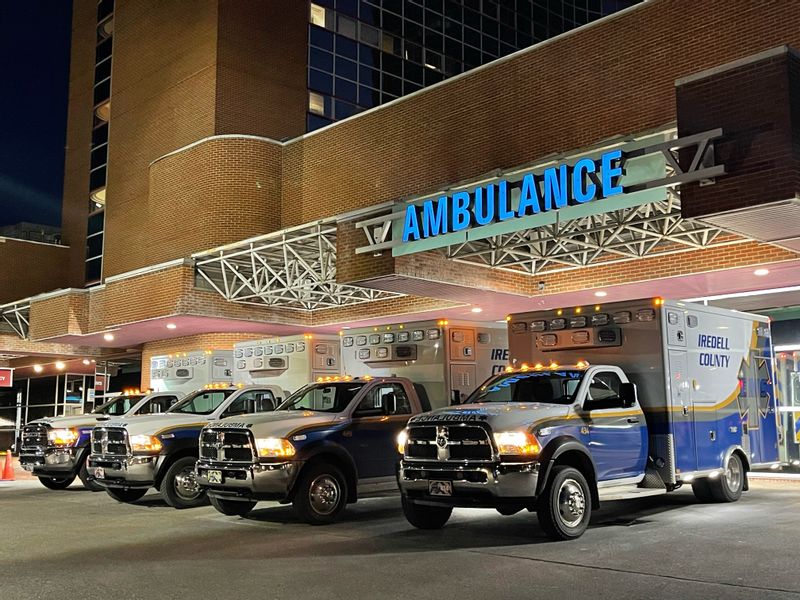When Minutes Matter, Don’t Wait to Call 911!

Monday, February 13, 2023
We never know when a heart attack will occur, but if this medical emergency does strike, getting help as soon as possible is crucial. Emergency Medical Service (EMS) personnel can make the difference between life and death when time is precious and minutes matter most.
Yet lately, Iredell County EMS Director, Blair Richey, and Iredell Health System Emergency Department Director, Rhonda Ruppe, have seen an alarming number of people with heart attack symptoms avoiding calling 911 and delaying medical care.
In fact, Iredell Health System data shows that over 75% of its heart attack patients are actually walking-in to the emergency department. But that can be dangerous, even deadly.
“We have known people to wreck driving in to the hospital. People have also passed away on their spouses or loved ones in the car on the way,” said Ruppe.
Even if you feel like you can, you should not drive yourself to the hospital and should not have someone else drive you.
“By the time the person develops symptoms of heart attack, many bad things have already developed, and the heart attack is in full motion on a cellular level. Depending on several factors, rhythm disturbances can rapidly develop, which can result in loss of consciousness, or even cardiac arrest, and sudden death. The sooner the person is under monitored medical care, the better,” said Charles DeBerardinis, cardiologist and medical director of Iredell’s cardiac cath lab.
During a heart attack, time is of the essence. By calling 911, you can receive medical treatment sooner, which dramatically increases your chance of survival.
“They say time is muscle. Within 90 minutes of heart attack onset, you should receive medical treatment to open the blood vessel. Don’t lose time by driving yourself to the hospital. When experiencing symptoms of a heart attack, please call 911, and let EMS transport you,” added Ruppe.
When you call 911 for chest pain, the dispatcher will give you instructions, called pre-arrival instructions, while you wait for EMS. These pre-arrival instructions include life-saving steps and precautions developed by the county’s EMS medical director.
“Our goal is to get to the patient in nine minutes or less, but depending on the area, it can be much quicker. First responders, such as local firefighters or rescue squad personnel, are often dispatched so they can start those life-saving measures until EMS arrives and takes over care,” said Richey.
One of the biggest advantages is that by calling 911, the EMS team can start medical treatment when they arrive.
EMS personnel are specially trained and can begin assessments and diagnostic tests at your home or in the ambulance. They can perform electrocardiograms (EKGs) that help diagnose heart attacks. Then, they will send the EKG to the hospital ahead of time, so the physician can start looking at it before you ever arrive.
“All the things EMS are able to start — the oxygen, the medications, the IV, the EKG, the aspirin — are what we would do if you arrived in the emergency room,” said Ruppe.
“If you wait, emergency room staff will have to start at square one when you walk into the door, just like where EMS would start when they walk into your home. It actually saves you time. If you have a 15-minute transport, it’s going to start that process and quicken that first medical contact,” said Richey.
EMS will also notify the hospital that you are arriving so they can start preparing the necessary cath lab equipment and staff.
“Our goal is for patients to have a seamless transition between EMS and Iredell Memorial Hospital,” said Richey.
Though dialing 911 is the best option when experiencing chest pain, some are still hesitant to make that call.
“I’ve heard that individuals in the community do not call 911 because they do not want to ‘bother us,” which is not what we want to hear. We are committed to saving lives, it’s our job, and it is not a bother to us,” said Richey.
Richey also explains that some people feel they are “not actually that sick” and doubt their feelings or symptoms.
“Don’t die because you are uncertain if you should call 911 or not. If you want us to come out and assess you and help you make that decision, we can do that. We can also reach out to an emergency physician if you need further confidence in what would be appropriate for your care. But, we advise if you are having certain symptoms that you should go and get checked out,” said Richey.
Do not hesitate to call 911 if you experience any of the following heart attack warning signs.
- Chest pain or discomfort
- Lightheadedness, nausea, or vomiting
- Jaw, neck, or back pain
- Discomfort or pain in arm or shoulder
- Shortness of breath
However, it’s important to remember that heart attack symptoms may vary. Women may not have chest pain and may experience subtler symptoms. According to the American Heart Association, some women experiencing a heart attack describe upper back pressure that feels like squeezing or a rope being tied around them. Dizziness, lightheadedness, or fainting are also common symptoms for women.
Even if you are not sure it’s a heart attack, it’s better to be safe than sorry. When minutes matter, don’t wait to call 911.
Photo courtesy of Iredell County EMS.
Originally posted by Greater Statesville Chamber of Commerce via Locable
Greater Statesville Chamber of Commerce
116 N Center St
Statesville, NC 28677
704-873-2892
www.statesvillechamber.org

